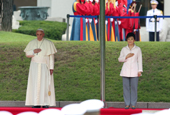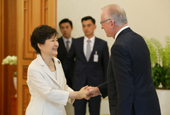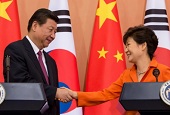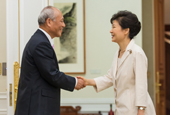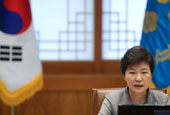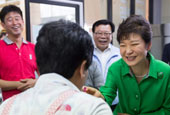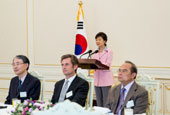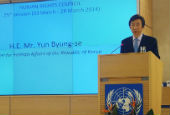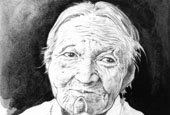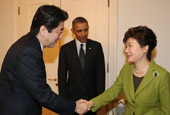-
 Korea.net's 24-hour YouTube channel
Korea.net's 24-hour YouTube channel- NEWS FOCUS
- ABOUT KOREA
- EVENTS
- RESOURCES
- GOVERNMENT
- ABOUT US
President Park Geun-hye has again asked North Korea to give up its nuclear weapons program and has suggested that the two Koreas start to cooperate on building infrastructure for the public's benefit and to improve the livelihoods of their countrymen.
"North Korea should leave behind habitual confrontation and division, give up its nuclear ambitions and open to the world," said President Park in a speech to mark the 69th Liberation Day at the Sejong Center for the Performing Arts in downtown Seoul on August 15. As examples, the president spoke of Kazakhstan, which gave up its nuclear program, and Vietnam and Myanmar, which have chosen to reform and to open to the world.
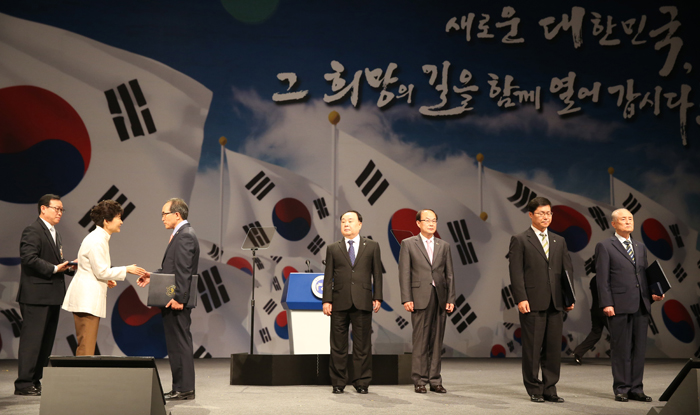
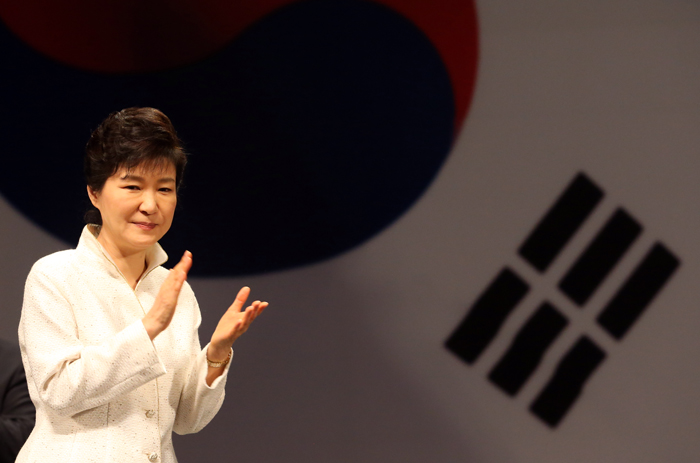
Suggests North take part in UN biological diversity meeting
"The two Koreas should start with feasible projects, take actions, combine their strengths and overcome their weaknesses," said President Park, calling these, "urgent tasks." "We need to connect the environment of the Korean Peninsula, restore it and find ways for environmental cooperation," she added.
To start such cooperation, President Park suggested the North take part in the twelfth meeting of the parties who signed the Convention on Biological Diversity, to be held in Pyeongchang, Gangwon-do (Gangwon Province), in October.
"Separated families should be allowed to unite, give each other humanitarian support and help each other to ease their pain," the president said. "The two Koreas can start their efforts to build infrastructure together and to improve the livelihood of the people by beginning with small villages."
Urges Japan to properly recognize history
Speaking of Korea-Japan relations, President Park said, "We hope that next year will become a starting point to walk toward a better future based on friendship between both the Korean and Japanese publics. So I expect Japanese political leaders to make wise resolutions," calling for Japan to properly recognize history.
"We can neither hide historical truths nor deny them because our descendants will continue to search for the truth and there exist witnesses to history," said President Park.
"Next year is the 50th anniversary of the re-establishment of bilateral diplomatic relations. Both countries need to develop a forward-looking cooperative relationship over the next 50 years. For that reason, there needs to be efforts to heal the remaining wounds of the past," said President Park. "Politicians need to read the public's mind and make proper choices, but some Japanese politicians are, instead, coming between the countrymen of our two countries and hurting the relationship."
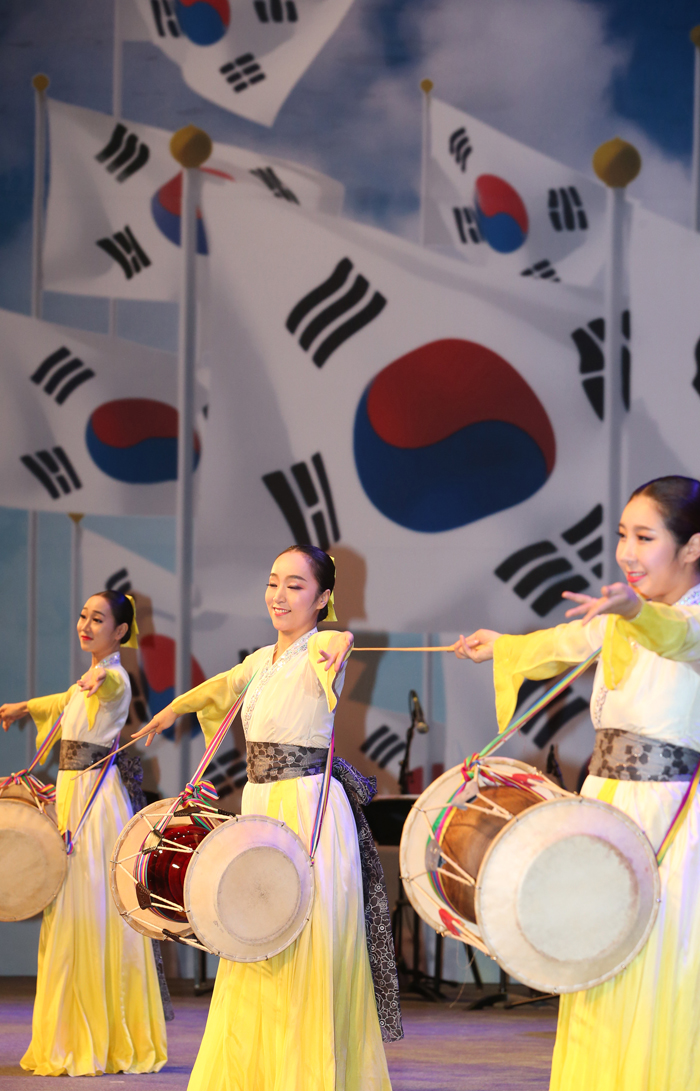
“The government has repeatedly urged Japanese leaders to face up to history and to take forward-looking measures for the elderly Korean women who were forced to serve as sex slaves, or, 'comfort women,' for the Japanese soldiers,” said President Park. “The relationship between Korea and Japan can develop soundly only when all these issues are resolved. Only then can both peoples wholeheartedly congratulate themselves on the 50th anniversary of the re-establishment of diplomatic relations between the two countries.”
She went on to say, “That is the responsible, proper path that the Japanese government should take, considering its future generations.”
President Park suggests the creation of a nuclear safety consultative group between Korea, China, Japan
Afterward, President Park expressed her concern over rising conflicts across Northeast Asia, saying that, “A series of conflicts concerning history and territory have heightened concerns across the region. Such cross-border conflicts lead to new issues concerning other areas, such as politics, economics and the military, too.
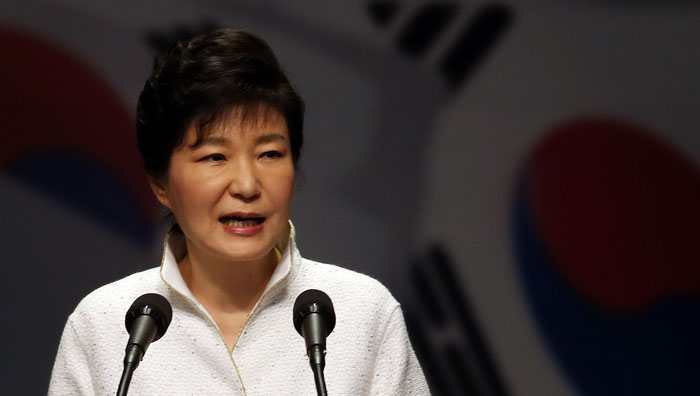
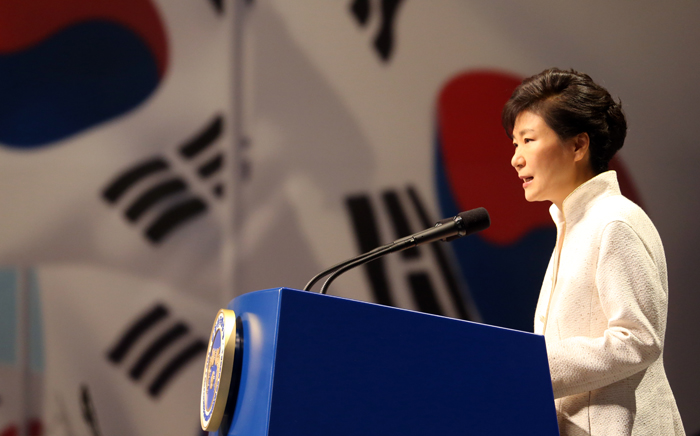
“However, it could be a good opportunity for us, depending on how we deal with these issues,” she emphasized.
The president also noted that the high number of nuclear power plants in the region increases public concern and fears about nuclear safety. To cope with the heightened concern, she suggested that Korea, China and Japan should lead the formation of a nuclear safety consultation body, on par with the European Atomic Energy Community (Euratom), an international organization that formed from the European coal and steel community which coordinates research and ensures the security of an atomic energy supply.
In addition, North Korea and Mongolia, as well as the United States and Russia, could also join the group, she said. “The body would expand cooperation in other areas, too, such as disaster relief, climate change and drug-related issues. Such cooperation would help lay the foundation for enduring peace and prosperity,” the president added.
She then urged neighboring countries to join the effort and to help begin a new era in Northeast Asia.
By Wi Tack-whan, Limb Jae-un, Sohn JiAe
Korea.net Staff Writers
whan23@korea.kr

"North Korea should leave behind habitual confrontation and division, give up its nuclear ambitions and open to the world," said President Park in a speech to mark the 69th Liberation Day at the Sejong Center for the Performing Arts in downtown Seoul on August 15. As examples, the president spoke of Kazakhstan, which gave up its nuclear program, and Vietnam and Myanmar, which have chosen to reform and to open to the world.


(Top) President Park Geun-hye hands out national merit awards during the ceremony marking the 69th Liberation Day at the Sejong Center for the Performing Arts on August 15. (Bottom) President Park Geun-hye applauses after the national merit award. (photos: Yonhap News)
Suggests North take part in UN biological diversity meeting
"The two Koreas should start with feasible projects, take actions, combine their strengths and overcome their weaknesses," said President Park, calling these, "urgent tasks." "We need to connect the environment of the Korean Peninsula, restore it and find ways for environmental cooperation," she added.
To start such cooperation, President Park suggested the North take part in the twelfth meeting of the parties who signed the Convention on Biological Diversity, to be held in Pyeongchang, Gangwon-do (Gangwon Province), in October.
"Separated families should be allowed to unite, give each other humanitarian support and help each other to ease their pain," the president said. "The two Koreas can start their efforts to build infrastructure together and to improve the livelihood of the people by beginning with small villages."
Urges Japan to properly recognize history
Speaking of Korea-Japan relations, President Park said, "We hope that next year will become a starting point to walk toward a better future based on friendship between both the Korean and Japanese publics. So I expect Japanese political leaders to make wise resolutions," calling for Japan to properly recognize history.
"We can neither hide historical truths nor deny them because our descendants will continue to search for the truth and there exist witnesses to history," said President Park.
"Next year is the 50th anniversary of the re-establishment of bilateral diplomatic relations. Both countries need to develop a forward-looking cooperative relationship over the next 50 years. For that reason, there needs to be efforts to heal the remaining wounds of the past," said President Park. "Politicians need to read the public's mind and make proper choices, but some Japanese politicians are, instead, coming between the countrymen of our two countries and hurting the relationship."

Performers dance the jangguchum, or double-headed drum dance, with the Taegeukgi, the Korean national flag, in the background during the ceremony marking the 69th Liberation Day at the Sejong Center for the Performing Arts on August 15. (photo: Yonhap News)
“The government has repeatedly urged Japanese leaders to face up to history and to take forward-looking measures for the elderly Korean women who were forced to serve as sex slaves, or, 'comfort women,' for the Japanese soldiers,” said President Park. “The relationship between Korea and Japan can develop soundly only when all these issues are resolved. Only then can both peoples wholeheartedly congratulate themselves on the 50th anniversary of the re-establishment of diplomatic relations between the two countries.”
She went on to say, “That is the responsible, proper path that the Japanese government should take, considering its future generations.”
President Park suggests the creation of a nuclear safety consultative group between Korea, China, Japan
Afterward, President Park expressed her concern over rising conflicts across Northeast Asia, saying that, “A series of conflicts concerning history and territory have heightened concerns across the region. Such cross-border conflicts lead to new issues concerning other areas, such as politics, economics and the military, too.


President Park Geun-hye gives the keynote address during the ceremony marking the 69th Liberation Day at the Sejong Center for the Performing Arts on August 15. (photos: Yonhap News)
“However, it could be a good opportunity for us, depending on how we deal with these issues,” she emphasized.
The president also noted that the high number of nuclear power plants in the region increases public concern and fears about nuclear safety. To cope with the heightened concern, she suggested that Korea, China and Japan should lead the formation of a nuclear safety consultation body, on par with the European Atomic Energy Community (Euratom), an international organization that formed from the European coal and steel community which coordinates research and ensures the security of an atomic energy supply.
In addition, North Korea and Mongolia, as well as the United States and Russia, could also join the group, she said. “The body would expand cooperation in other areas, too, such as disaster relief, climate change and drug-related issues. Such cooperation would help lay the foundation for enduring peace and prosperity,” the president added.
She then urged neighboring countries to join the effort and to help begin a new era in Northeast Asia.
By Wi Tack-whan, Limb Jae-un, Sohn JiAe
Korea.net Staff Writers
whan23@korea.kr
Related Contents
Most popular
- First hearing-impaired K-pop act hopes for 'barrier-free world'
- Event 'K-Beauty Hang Out' draws hundreds in Philippines
- Ceremony in Seoul inducts 2,641 content creators of Korean culture
- 'Mad Max' director impressed by 'cinema-literate' Korean viewers
- Cultural spring festival Seoul Festa to start on May 1









